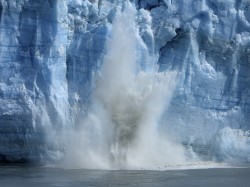My friends and I have been hunting elk in Idaho at the same place and time of year for more than 20 years. We will never forget the early trips when it was normal to encounter cold, wind and snow — the kind of weather common to big-game hunting in the West. It would always freeze at night, and in between storms we were treated to cold, crystal clear nights when the skies were studded with stars beyond our imagination.
As the years went by, we found ourselves better supplied and better prepared for the elements.
What we didn’t know was that our need for cold weather gear would slowly decline. Last year, a member of our hunting party wore shorts — in November, at 4,000 feet high up in the Idaho wilderness.
I know the local weather is not necessarily a specific effect from long-term climate change. Nevertheless, if I ask my conservative hunting partners whether they think the changing weather where we hunt in Idaho is a result of global warming, they will, without skipping a beat, say absolutely.
We have all heard or read about ocean acidification, melting glaciers, declining Arctic sea ice, record heat in the Northwest, followed by record floods in the fall. On and on scientists keep telling us about various events around the world and locally that are related to climate change, which has been brought about by the human-caused increase of CO2 in the atmosphere. The writing is on the wall: Human-caused climate change is happening as we speak. The only question now is what we can do about it.
The Washington Wildlife Federation is a statewide organization made up of hunters, anglers, bird watchers, hikers, bikers, skiers, kayakers, climbers and many others; we lean right and we lean left, but all of us believe that healthy natural resources are essential for our quality of life. We believe that human-caused climate change poses a huge threat to the stability and future of these resources, and we believe we have a moral and ethical responsibility to protect these resources, not only for our own well-being but for that of our children and grandchildren.
It is time the public starts to hear the truth — not only about the science of climate change, but about the dead-end economics and vulnerability we face if we continue to depend on fossil fuels. The truth is, we can avoid the most catastrophic consequences of climate change if we act now. The truth is, we can create millions of new clean-energy jobs for American workers across the country by investing in clean, renewable energy. The truth is, we can eliminate our dependence on foreign oil. The truth is, we can keep our outdoor traditions thriving by using revenue from climate legislation to safeguard fish, wildlife and other critical natural resources impacted by climate change.
The U.S. Senate is in the midst of considering the Clean Energy Jobs and American Power Act of 2009. Our Federal delegates from Washington state, including Republican Representative Dave Reichert, have stepped up and delivered when it comes to climate and conservation issues in the past, and we call on Senators Maria Cantwell and Patty Murray to provide the needed leadership in the Senate to pass comprehensive clean-energy jobs and climate legislation this year. It will revitalize our economy, create new jobs, safeguard our national security, protect our natural resources and reduce pollution.
I have four young grandchildren. When they’re old enough to understand, I don’t want to have to explain to them how we sat on our hands and did nothing about global warming and climate change. I don’t want to have doubts about their future. I would rather tell them the story about how people in the United States finally figured it out and decided, during a watershed moment in 2009, to put a cap on greenhouse gases and to build a new energy economy based on clean renewable energy.
Mark Quinn is the president of the Washington Wildlife Federation.
















